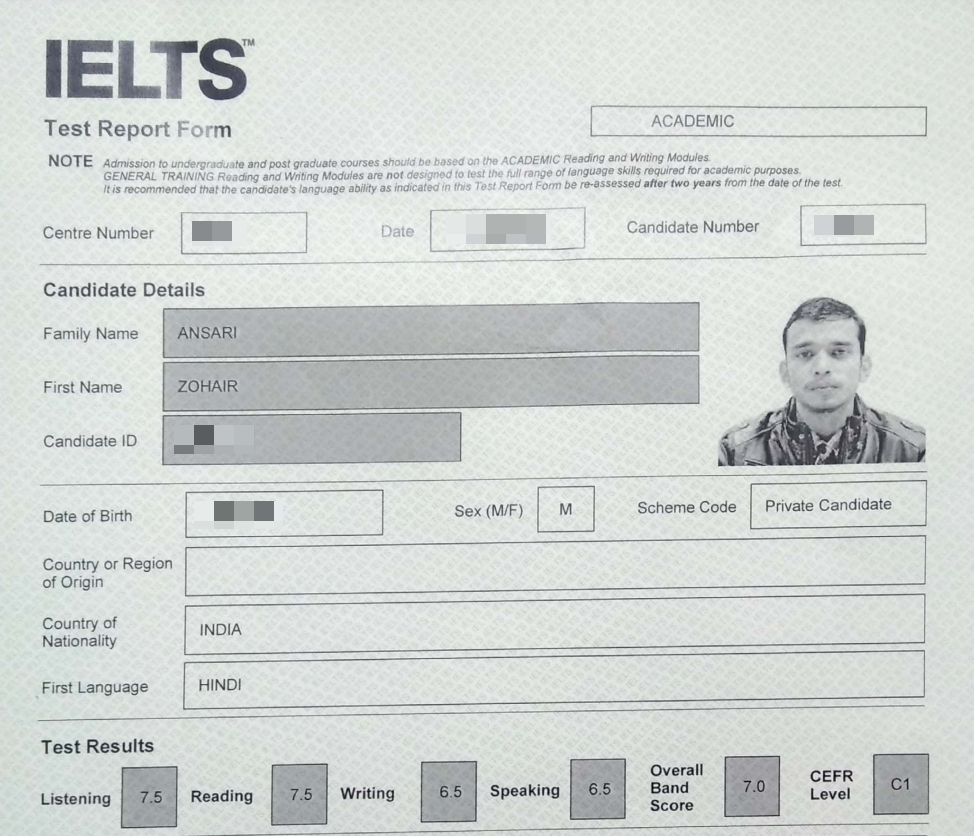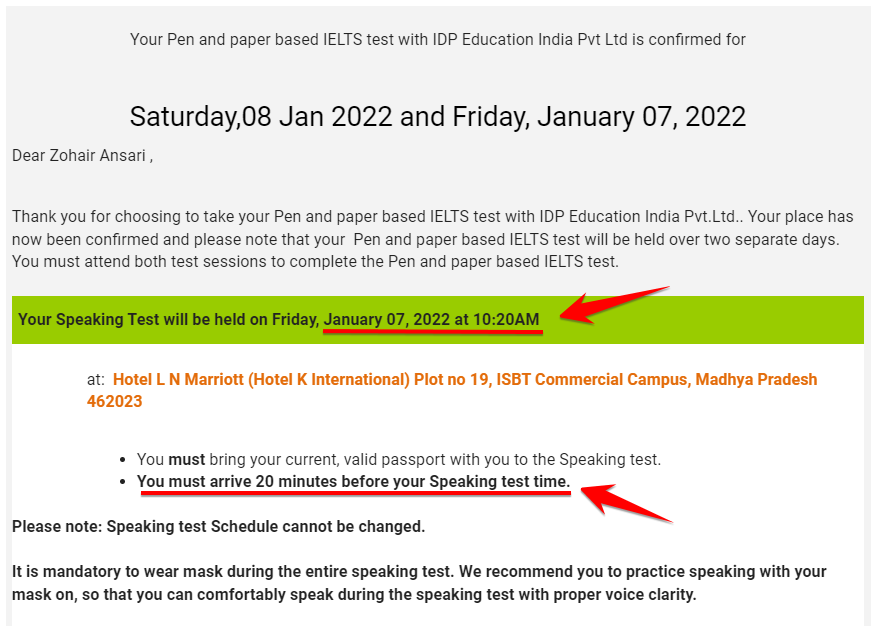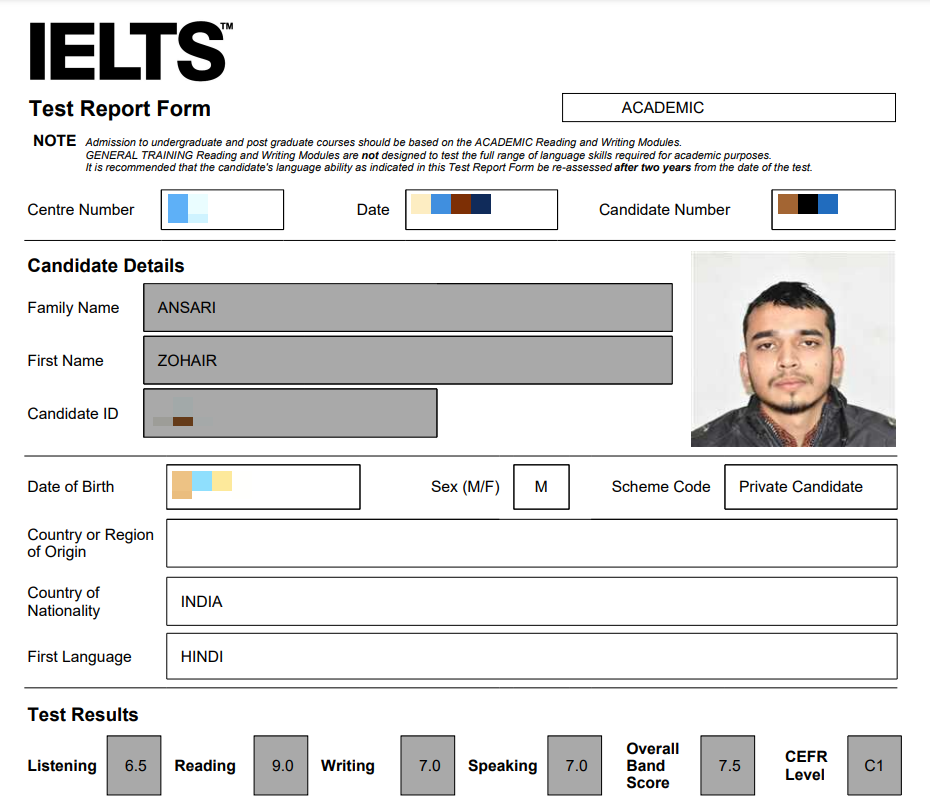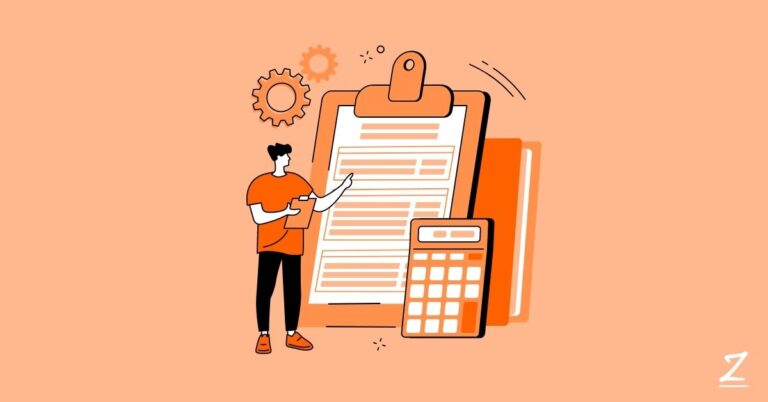
If you’re planning to give your IELTS Speaking, this post is going to help you with some valuable tips and advice as I will be sharing, in a detailed manner, my honest and personal experience of giving the IELTS Speaking Test twice (once in 2019 and the other in 2022) ✌
Moreover, I will share the mistakes I made, which, if you make, can be really costly for your exam and career. Therefore, read till the end and learn from my mistakes before entering the IELTS Speaking Center and giving your speaking test 📝
If you’d like to watch me give my *RAW* experience after I took the IELTS Speaking Test, I’ve filmed a video on that already. I highly recommend you watch it if you’re someone who prefers video over text like me 😅
It also contains some juicy stuff, including my IELTS Results Reaction in which I opened my test scores on camera and reacted to them 🤭
Background
Before I dive into my experience, I’d like to give a little background about myself. In high school, I did the IB Diploma Programme, which left me with little time to think about College Applications. Despite this, I managed to prep and take the SAT Subject Tests, SAT General Test and the IELTS Test in the second semester of Grade 12th ✍
Specifically speaking, I gave the IELTS Test on 14th December 2019 and scored an overall band score of 7.0 with the following breakdown of the four components.
Listening – 7.5 / 9.0
Reading – 7.5 / 9.0
Writing – 6.5 / 9.0
Speaking – 6.5 / 9.0
Overall – 7.0 / 9.0

Honestly, I didn’t get the time to prepare much for any of the components because I was busy with my SAT preparation. However, since I had studied in an English-medium school and fortunately had the practice of speaking in public because of my involvement in various co-curricular and extra-curricular activities like student council, community service etc., I managed to clear my speaking test 🥳
I got a 6.5 band score even though I was super tensed before and during the speaking test. By “clearing the test”, I mean that I scored a band score of 6.0 or above in all the components, which is currently the requirement for international students to apply for a study permit in Canada.
After I cleared the IELTS test in my first attempt, in 2020, the pandemic hit, and I had to keep my study abroad plans and college applications on hold. I waited to apply to international institutions for the fall of 2021, and yes, I did.
I submitted applications to thirteen universities in North America, mainly in the United States. Still, to my surprise, I received only one acceptance and got rejected from all the other universities I applied to 😞
The one admission offer I received was from the University of Toronto, which surprisingly came along with a very generous scholarship offer known as the U of T International Scholar Award. It almost covered 60% of my total cost of attendance to U of T 🤯
However, I had to drop the admission and scholarship offer due to financial constraints and decided to give another shot to top universities abroad.
In 2021, I applied to NYUAD and gave my final shot to study at a top university abroad. Unfortunately, that didn’t work out either. So as a last resort, I decided to apply to some good Canadian Colleges where I can continue foreign education with a decent budget.
The challenge was to give the IELTS again as two years had elapsed since I first took the test in 2019. I booked the exam on 8th December 2021 for the test date of 8th January 2022. I had exactly one month to prepare for the IELTS test and that too, all on my own 🤷♂️
I didn’t take a course or join a coaching institute, rather I self-studied for the test and gave the Speaking Test on 7th January 2022 and the Listening, Reading and Writing Exam on 8th January 2022.
Preparation
As I said, I was self-studying for the IELTS test, which meant that I had to take a ton of practice mock tests on my own with proper exam conditions. It was an easy task when it came to the listening, reading, and writing section; however, I needed a partner to practice for the speaking section 👯♂️
That’s where I took the assistance of my elder brother, who would temporarily act as my speaking examiner and conduct my mock speaking tests on an everyday basis. We used Makkar IELTS Speaking Queue Card books and IELTS Material‘s queue cards for practice.
For each mock speaking practice test, I would
⏺ Record my voice.
▶ Replay the recording.
🤔 Identify my mistakes in the light of the criteria.
🤨 Think of better vocabulary for the spoken sentences.
😎 Read modal answers for the questions and queue card.
✍ Take note of improvements and better answers.
👊 Try to correct all of my mistakes to perform better in the next attempt.
Basically, this is how I prepared for the IELTS speaking test until the test date.
Day Before the Exam
In the first week of January 2022, only a few days before the exam, I received an email from IDP giving all the information about the test centers and the dates for my LRW (listening, reading, and writing) and speaking test. 👇

If you don’t know, the listening, reading, and writing components of the IELTS are mainly conducted on the test date, whilst the speaking test is conducted separately before or after the test date. The IELTS team gives prior notification about the text dates and centers via email, so don’t worry about the information and keep checking your email 📩
According to the email I received, my speaking exam was scheduled a day before the test date on 7th January 2022.
On 6th January 2022, I prepared for the exam with my brother, conducting 2-3 mock speaking tests. Plus, I watched several YouTube videos on strategies and ‘tips before taking the speaking test’ 📱
To be specific here, I watched the IELTS Speaking videos of IELTS Daily and IELTS Advantage to brush up on the speaking examiner’s core expectations and remind myself of the things to remember before the speaking test.
However, unlike most students, I made sure to not stress myself too much with preparation and take enough rest/ sleep (at least 8 hours) before I took the exam the next day. Taking adequate rest according to your body’s requirements esp. before the speaking test, is a really effective yet frequently underestimated tip 🛏
Most candidates stress themselves on the last day without realizing that IELTS Speaking cannot be aced in a day if you haven’t developed a good command of the spoken language. Therefore, it’s better to sleep well and relax your mind before you commute to the exam center 😇
Going for the Test
I slept from 11:15 am to 6:15 am, woke up and prayed, then slept from 7 am to 8:30 am. In total, I took 8.5 hours of sleep. I got ready (physically and mentally), had a good breakfast, and left for the exam center with my father at 9 am 🚘
Pro tip: Do not forget to eat your breakfast before going for the test. Personally, had I not eaten my breakfast, it would’ve been a totally different experience because my stomach would’ve been upset, and so would my body. After all, they require energy after long hours of sleep. So SLEEP WELL my friend 💤
The speaking time allotted to me was 10:20 am and along with this Timing, the IDP’s email mentioned that “You must arrive 20 minutes before your Speaking test time.” Hence, I was expected to reach the exam center at 10 am.
It was a 30 minutes ride from my home to the exam center, and leaving my house at 9 am was the right time in my opinion because I would reach the center precisely 30 minutes before the allotted time. I opened Google Maps on my phone and set the destination to the hotel mentioned in the email 🗺
Moreover, I made sure that I had Aarogya Setu (Indian Government’s COVID–19 app) installed, and on that day, it showed “You are safe.” I opened my notebook and revised some of the idioms and vocabulary I had hoped to use for the speaking test.
I also went over some of my notes which I prepared for last-minute revision just before the actual exam, so I didn’t forget the important stuff.

By the way, just to let you know, the IELTS team checked the Aarogya Setu app, neither on the speaking date nor on the LRW date. I was unnecessarily worried about my health status on the app 🤦♂️
This is what happened with me, probably your test center might check it. So do install the app anyway and fulfill other requirements to be on the safer side 🙂
Sudden Turn of Events
Everything was going as planned until we reached the location displayed on Google Maps. According to the Google Maps app, we reached the exam center; however, we were under a bridge, where there wasn’t any hotel named “L N Marriott.” 😞
It was 9:28 am, and we had only 32 minutes to find and reach the hotel for the test. My father, who did know a bit about the area (thanks to his driving profession), told me he had seen some hotels on the other side of the bridge. I quickly asked him to take me there.
Yes, we reached there and frantically searched for Hotel L N Marriott.
We couldn’t find it 😣
I got out of my father’s auto-rickshaw and enquired about the hotel from a stranger standing in front of one of the hotels. He didn’t know the hotel either 🙅♂️
Then I trusted Google Maps and took my father to the same spot we reached earlier. I knew that the hotel would be somewhere near that place because Google couldn’t be wrong. My father and I were inquiring and searching again.
Now, my mobile’s clock showed 10:10 am 😲
We were already 10 minutes late, and the exam was scheduled to begin in 10 minutes.
I was in a state of shock and total helplessness 😫
It was tough to cope up mentally because the feelings of missing the exam started creeping into my mind. A part of me began to lose hope 😩
However, God sent his help through my father. My father asked me about the address mentioned in the email. I told him, “Plot no 19, ISBT Commercial Campus.” He said that this was not that place and immediately started riding on a different route.
A marvelous idea struck my mind in this state, and it was to call the hotel staff. I asked them about the hotel’s address, and they were kind enough to guide me to the correct route. It was a massive relief to find the test center. 😌
Quickly, I got out of the vehicle and ran towards the hotel. It was already 10:25 am 🏃♀️
I was 25 minutes late according to the allotted time and 5 minutes late for the actual speaking test. I was extremely anxious as I walked towards the hotel 😰
I saw a student reading his notebook and quickly inquired about the IELTS test; he asked me to go upstairs. I used the stairs, ran as fast as possible, and reached the first floor. I couldn’t see any exam happening. I looked at different rooms but couldn’t find the exam center 😖
There were no arrows or signs to guide students. I moved to the second floor and couldn’t find anything. Sweat was dripping down my face, plus I was wearing a mask which meant that I couldn’t breathe my full 😷
Alas, I reached the third floor and found a kind girl with some papers in her hand. As our gaze met, she asked me whether or not I was Zohair Ansari. I said, “yes,” with a worried face. She was part of the IELTS team and took me to the registration room.
Seeing this, I sighed in relief. 🥺
Registration
First, I was asked to sign some forms related to taking responsibility for my health in light of Covid-19 and International travel. I skimmed through them and signed them. Then, I asked the registration team for water, and that’s when I removed my mask and took a deep breath to drink water 💧
At last, I was photographed, and within half a minute, the girl took me to the Examiner. She told me not to give my passport to the Examiner and only show it from a distance in a particular way (which she was kind enough to explain). It was a Covid-19 precaution 🦠
Next, she opened the door for me, and I went in 💀
Before moving forward, I would like to give my number one advice when it comes to commuting for the IELTS speaking and LRW (Listening, reading, and writing) tests. It is to follow the address of the hotel test instead of entirely relying on Google Maps.
This is because Google Maps can mislead you in dangerous ways by showing you the wrong location, especially if you’re from countries like India, Pakistan, Nepal, Sri Lanka, and Bangladesh. If you can visit the hotel a day before the test date to check the right spot, there is nothing better to do than that 👊
I also feel that IELTS, an international organization that charges a huge sum of money for the IELTS test, should make sure that the hotel they are choosing for their exam should be correctly listed on Google Maps.
They should at least make sure that the hotel is mapped on the right spot in Google Maps because most hotels (regardless of their popularity) in the developing world are yet to update themselves or their correct location on Google Maps. In my view, here this is the job of IELTS, not the hotels, because they lack information and awareness about it.
Moreover, IELTS, IDP, and their partners should make sure to place signboards/ arrows at the hotel entrance, stairs, and on different floors, so candidates can easily find the right place 🛑
Alternatively, IELTS and IDP can designate a representative outside the hotel to guide candidates who might otherwise get confused or lose their way to the test center 😕
Speaking Test
I entered, greeted the examiner, and sat on an empty chair facing her 🙂
The examiner welcomed me and asked me whether I was ready for the test. I nodded in affirmation. She started the test as you would see in a typical IELTS Speaking test video on YouTube by setting up the voice recorder and asking for my name and passport 🗣
After which, she quickly moved towards the first section of the test.
Part 1
The first section of the test was about my hometown, a really common topic for part one of IELTS Speaking. I was a bit prepared to speak on that as I had practiced speaking on this topic with my brother 🧑
However, the examiner asked some unique follow-up questions related to this topic, like whether or not I learned about the history of my hometown when I was young, etc. Nevertheless, I was able to speak on that 🏡
After that, for a brief period, she touched on the topic of cars and asked me whether I love to drive it or sit passively and whether or not I enjoyed taking a ride as a kid. I spoke continuously and connected everything with my personal experience 🚗
If you don’t know, there are a set of topics that often repeat in part one of the IELTS speaking tests, and these topics are
- Work or studies 👩💻
- Family 👨👩👧👧
- Home 🏠
- Hometown 🌳
If you want to make an excellent first impression in your IELTS speaking test, know a little more about these topics and practice them in your mock speaking.
But remember not to learn your answer by heart as you need to make sure to sound natural to the examiner. I suggest you have a good number of ideas for each of the four topics and practice speaking on them. Your mind will take care of the rest: remind you of those ideas in your speaking test 🧠
Unexpectedly, I was so calm and composed in answering these questions that I myself felt a bit shocked. I felt a sense of confidence coming out in my voice, and I know the reason for that, which is that only a couple of minutes back, I didn’t know whether I’d be allowed to give the exam, and now, I was sitting in front of the examiner speaking.
Actually, I was in a state of gratefulness and felt fortunate for speaking to the examiner, and that’s why I was in my best space possible 😎
Part 1 was over, and I felt that I decently answered the questions; however, there was a bit of nervousness and lack of confidence in my speech which led to many filler words in my sentences. Nevertheless, the stammering wasn’t too much to make me lose my confidence.
Part 2
Now, the examiner moved on to the second section of the test, reading some instructions on the paper. She told me the format of part 2 by saying that I am supposed to speak on a topic for 2 minutes and that I have a preparation time of 1 minute to prepare my ideas and take notes.
I knew all of this as I was familiar with the structure of the test and had watched a ton of IELTS Speaking Band 9 videos on YouTube 🤩
The examiner and I were a good distance away from each other, with two large tables separating us (to protect from covid-19). I didn’t tell you this, but some papers and materials were spread on the table in front of her.
There was a piece of paper in which she frequently scribbled some notes throughout the speaking test, and I also saw a marking sheet that contained a big table with a lot of columns with some names written on it 📑
Probably, these names were of candidates who had already given their speaking test before me because, in front of each word, some numbers were always written, which I suppose might be the grades they received.
Don’t get me wrong here. I didn’t take a good look at that paper; instead, it was an accidental glance that was unintentional but captured these details 😅
Ok, getting back, the examiner pulled a booklet from the mess on the table and started reading some instructions from it. The booklet contained the speaking topics for part 1 and part 2 of the IELTS test. I guess this booklet was created and printed by the IELTS organization for the final IELTS exams. It was similar to the Cambridge IELTS Academic Student Books.
As she spoke the instructions, she flipped the pages and passed the booklet over to me while pointing at the page which contained the topic I was supposed to speak on. I looked at the page, which read, “Songs.” 🎵
I smiled externally while my internal self freaked out hard as I had no idea about songs because I didn’t listen to them. This might seem counterintuitive, but yes, I am not a big fan of songs, even though hardly anybody in the world doesn’t listen to them in today’s day and age.
As soon as she passed me that booklet, she said, and I quote, “You have 1 minute to prepare your response. Please do not write on the booklet. Here is a pencil and notepad which you can use to take down notes, if you want. Don’t worry, I’ll let you know when the time is up. You may start now.” 🤓
If you don’t know, the queue card contains a bold heading at the top left-hand corner, followed by three to four questions to help you generate ideas about the topic. You can stick to the questions if you want, but you can add more ideas if you want.
On a side note, if you want to practice for the speaking component, there are tons of practice queue cards available online, and that too with modal answers. A website that I primarily used and loved was IELTS Material, where they laid out the strategies and modal responses for the IELTS Speaking Test 💻
The queue card I received had the following questions:
Describe a song you find interesting
You should say:● What that song is?
● Where you first heard it?
● What kind of song it is?
● And explain why you like it.
Now, if you are appearing for your IELTS Speaking exam soon, conduct a practice test with this queue card before looking at any modal answers online. You never know, you might get this on the test day 😀
More importantly, after you’re done practicing with this queue card, do check out this and this website for the queue card’s brilliant modal answers. The modal answers will help you improve your response for this topic by helping you with content ideas, identifying your mistakes and potential uses of vocabulary for this topic.
I read the queue card on the page and had no idea what song I would speak on. Instead of worrying about my lack of knowledge about the topic, I pondered over it. Luckily, an exciting idea struck my mind of speaking about a song that was honestly a big part of my identity, the Indian National Anthem 🌍
I felt a little relief inside and wrote down key points about the topic on the notepad; however, there was a bit of a doubt in my mind as to whether the national anthem is a song or not. As you can guess, I had no other option but to go ahead with this since I didn’t know what other song I would speak on if I didn’t go ahead with the national anthem.
Though the Indian national anthem was originally a poem, it was adopted as a song later on. So yes, I was right, but even if I were marginally wrong regarding the topic, IELTS wouldn’t have held it against me when giving me a score as long as I spoke well and didn’t deviate from the topic substantially.
Soon, the time was up, and instead of writing full sentences, I jotted down keywords for each question on the queue card and wrote two idioms that I could use in my speech (btw, I forgot to use them 😅). The examiner signaled me to start, and I started speaking.
I didn’t start well but slowly gained momentum as I spoke. I talked about the Indian National Anthem, its history regarding the Indian subcontinent, its symbolism with the Indian independence from the British Rule, and its importance for me as a symbol of unity in the diversity and multi-ethnicity of India 🤝
Doing a self-assessment of my performance, I think I did a pretty good job with regards to the content of my answer, and was pretty natural as I spoke it. However, I would’ve lost marks in the fluency and coherence marking criteria of IELTS speaking as I frequently hesitated while giving the answers, and my response wasn’t that structured either 🙄
For your information, there are four marking criteria in the IELTS Speaking test:
- Fluency and coherence.
- Lexical resource (which is related to vocabulary).
- Grammatical range and accuracy.
- Pronunciation.
The examiner will mark you for each of the four criteria out of 9 bands, and your speaking band score will be the average of the bands you received in each criterion.
If you want to learn more about these speaking criteria, don’t forget to check out the IELTS Speaking Criteria’s Official Band Descriptors, where you can learn in detail about the examiner’s expectations and what you’re required to do for scoring a band 9.0 in each criterion.
Part 3
Two minutes passed, and the examiner stopped me. Immediately and without prior instruction, she moved to part three of the speaking test by questioning me with the following question:
What song is popular among young people today?
As I mentioned before, I had no idea about different songs, their popularity, their artists, or the different music tastes in my country except for two words, i.e., hip-hop and rap 🎙
And I knew them only because I’ve been a video editor for a long time, and there are various pieces of music that editors commonly use in these two music categories. Apart from the name, I didn’t know anything else. Hence, I didn’t speak about them at first.
So what did I say?
I said, “traditional music is gaining popularity in India with increasing number of young people looking to connect with their roots.” However, she wasn’t satisfied with the answer and questioned whether young people have different music tastes apart from traditional music.
I had nothing to say, and to not go blank, I stated Rap and Hip-hop. I don’t know what happened to her, but it was a good trigger for her to start questioning me back and forth about these types of music.
She asked me why people are listening to hip-hop and rap? to which I talked about short-video platforms like TikTok, Instagram Reels, and YouTube Shorts that are making rap and hip-hop music popular among the masses.
In some instances, I felt as if I was in a debate because my examiner was not letting me speak as she was questioning me back and forth without allowing me to complete the answer 😂
If you notice, this question was about a ‘particular’ song that is popular, not about the genre or type of music. Obviously, I made a big blunder here by stating Rap and Hip-hop, which are genres of music and specific songs.
I noticed it after reflecting upon the experience. Hence, please do not say things significantly unrelated to the question. It might lead to lower bands in lexical resource criterion as it requires the use of topic-specific vocabulary by the candidate.
Then, she moved to the next question, which was,
Do older people like the same music as young people?
I said no instantly because I had been a first-hand witness of the drastic difference in tastes between older and younger people 👦
To support my argument, I gave the example of my father listening to the songs of the 90s, which are relatively calm and composed as opposed to the tastes of today’s youth who prefer loud, noisy, and actionable music to make themselves happy and satisfied.
Then she asked me to elaborate more on that, which I did with little additions along with content-based hesitations. You will not be negatively marked for content-based hesitations, which are hesitations due to lack of content in mind, but you’d definitely lower your band if you hesitate to find words or grammar.
After this, she asked another follow-up question on this by saying the following:
Do your friends like the same song?
I said that I don’t know in detail about their current music taste, so I wouldn’t consider myself qualified to answer the question. However, to not sound ignorant, I talked about the past music tastes of my friends when I was in school studying with them.
Lastly, she asked me about human-made music and natural music. I do not remember the question exactly, but it remained in conversation for short. It was along these lines:
Do you think that the sounds of animals is a type of music?
I said yes and gave the example of birds chirping in the morning and communicating with each other. I then followed it with the argument that people love to listen to birds and other animals because of the pleasant rhythm they generate.
“That is the end of part 3 and your speaking test, Thank you so much.” said the examiner as soon as I completed my answer.
I said, “thank you,” and got out of the room with a smile on my face because I felt I performed a bit better than the last time I took the test in December 2019. I wasn’t that confident and natural with my answers during my first speaking test.
Moreover, as far as I remember, I hesitated a lot at that time, which led to a score of 6.5. That’s why when I walked out of the room after giving my second IELTS speaking test, I had a gut feeling that I’d score higher than the last time or at least the same band as the previous time, not worse than that.

And my intuition was correct. I ended up scoring a 7.0 in IELTS speaking with an overall band score of 7.5. It was great seeing a 0.5 band rise in my speaking score. I hope you had seen my smile when I opened my IELTS results in the video at the beginning of this article 😁
If not, then do see the video down below, which is a shorter version of the previous video. Here, I have revealed and reacted to my IELTS results in 60 seconds. Btw, Feel free to connect with me on Instagram for any question or comment 😉
Now, there is no doubt about the fact that you are giving your IELTS exam for studying abroad or for immigration purposes. Still, if you are a high school student looking for fully funded undergraduate scholarships around the world, it will be really helpful for you to check out my fully-funded scholarship blog posts below 👇
Check Here 👉 55 Fully Funded Scholarships in Canada, UK, US, Australia, New Zealand, and Europe
Check Here 👉 57 Fully Funded Scholarships in in Singapore, Japan, China, South Korea, Turkey, Hong Kong & more.
These posts detail various opportunities you can take up, and they can end up helping you save a ton of money, for which you’ll thank me later.
Conclusion
That’s pretty much what I had to say regarding my IELTS Speaking experience. Overall, I would give you the following do’s and don’ts before I end:
Do’s
✅ Sleep well. At least 8 hours before you go for the test.
✅ Eat nutritious food and have a good breakfast before you leave.
✅ Try to be as natural as possible with your speech. Don’t make a fake accent, please.
✅ Pronouncing each word fully and appropriately.
✅ Including Topic-specific vocabulary in Part 2.
✅ Being fluent (not using unnecessary fillers like aa, umm, aah, like, you know, etc.).
✅ Taking appropriate pauses. Not too long, nor too short.
✅ Smiling and maintaining eye contact with the examiner.
✅ Being organized and coherent with the response (try using linking words for coherence).
✅ Practice speaking with a mask before the test (Be fully prepared (mentally and physically) to ACE the test).
Don’ts
❌ Memorizing answers and regurgitating them during the text.
❌ Excessive hesitation (maintain your confidence no matter how much you know/ don’t know about the topic).
❌ Worrying and stressing too much (stay calm and Practice).
❌ Speaking off-topic (Stick to the question for the most part).
❌ Self-correction (leads to repetition. Move on and try speaking fluently).
❌ Speaking too fast or too slow (Check your speed and try speaking at a decent pace with correct delivery of words).
❌ Not speaking for 2 minutes in Part 2 (try practicing with different unknown topics before the test).
❌ Writing full sentences when taking notes in part two (use the preparation time wisely by jotting down keywords and elaborating on them in speaking).
❌ Saying Idioms in the wrong context or just for the sake of saying it (Try including idioms in the proper context. Do not insert them in your speech unnecessarily and in the wrong context).
❌ Using high-level vocabulary without complete knowledge (don’t use complex words unless you are sure of their correct usage).
Enjoy the experience without worrying about it way too much like me. Trust me; it will be a totally positive experience without stress and worry 😃
If you’ve been reading this article all this time, do let me know by commenting “I read till the end,” in the comment section below. Also, make sure to let me know your experience of going the IELTS test, whether it was a similar experience or a completely different one, so that other students can get various perspectives about it.
All, this was it. Thank you so so much.
I hope you liked it.
See you soon, in the next one.
Bye 🙋♂️






Your words have a way of evoking empathy and compassion in your readers.